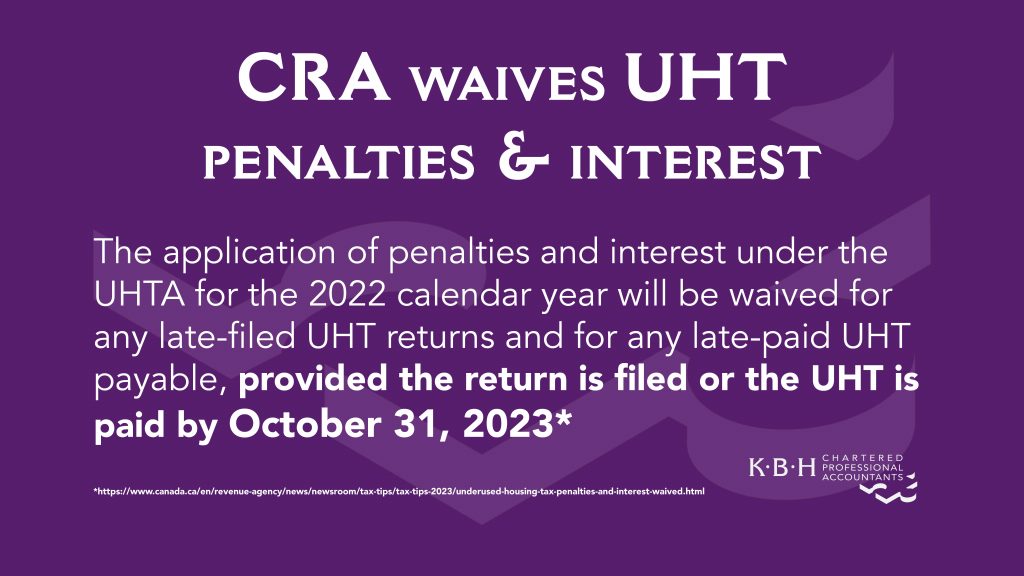Member Submission

To File or Not to File, That is the Question
Submitted by, Jody Horvath KBH Chartered Professional Accountants
September 27, 2023

The Underutilized Housing Tax (UHT) is a recent policy introduced by the Canadian government in an effort to address the issue of underutilized housing units in the country. The tax aims to incentivize homeowners to either rent out or sell their underutilized properties, thus freeing up housing stock for those in need and reducing the strain on Canada's housing market.
To help homeowners (individuals, corporations and trusts) understand if they are required to file a UHT return and pay the UHT, a simple flowchart has been created that outlines the requirements and exemptions for filing and payments. The flowchart considers factors such as the use of the property, its occupancy status, and the length of time it is underutilized. If you own, or are on title for multiple properties, please consider each property individually as you may need to file/pay for some and not others.
For some, you may have to file, but not have to pay. Failure to do so may incur minimum penalties of $5000 to $10,000 per property, even if you owe $0 UHT. The returns are due on October 31, 2023 for properties owned on December 31, 2022.
The UHT applies to all those who own or are on title of an eligible residential property in Canada that is not the owner's principal residence. An eligible property is one that is either unoccupied or underutilized.
It's important to note that the UHT is not applicable to all properties. If a property is used as a principal residence or is rented out for more than 6 months in a year, the owner may be exempt from having to file a UHT return or paying the tax.
Using the flowchart, start by determining if you are on title of a residential property at the end of the calendar year. If you are, the UHT may apply to you. Next, review the exemptions to see if you are an exempt owner, if you are then the UHT does not apply to you, however if you are not an exempt owner, then you have a filing requirement. Finally, you need to determine if your property is exempt or subject to the tax. If your property meets one of the exemptions then you only have to file the UHT but do not have to pay any tax. If your property is not exempt, then the final step is to calculate the tax.
To calculate what you owe, multiply the value of the residential property by the 1% tax rate. Then multiply that result by your ownership percentage of the property.
There are two ways to determine the value of a residential property. The general rule is to use its taxable value. If you want to use its fair market value instead, you must file an election with the Agency and have an appraisal completed by an accredited, professional real estate appraiser.
Canadian Controlled Private corporations that own residential real estate will most likely be required to file a UHT return though many will be exempt from paying any tax. The corporate year end does not come into play with respect to the UHT return. All returns need to be filed on or before April 30, 2023 in order to avoid the penalty.
The UHT has been met with both support and criticism. Despite the controversy, it remains a relevant policy issue in Canada, as the government continues to explore ways to address the issue of underutilized housing. Whether you support or oppose the tax, it's important to understand how it works and who it affects.
If you have questions about the UHT and whether you may be required to pay it, we encourage you to reach out to info@kbh.ca or get in touch with your accountant for more information. They can help you understand the eligibility criteria and calculate the tax, ensuring that you are fully informed and prepared.
Reference links:
Introduction to the Underused Housing Tax - Canada.ca
https://www.canada.ca/en/services/taxes/excise-taxes-duties-and-levies/underused-housing-tax.html
The Member Blog.
Want to share your story? Submit your blog today!
